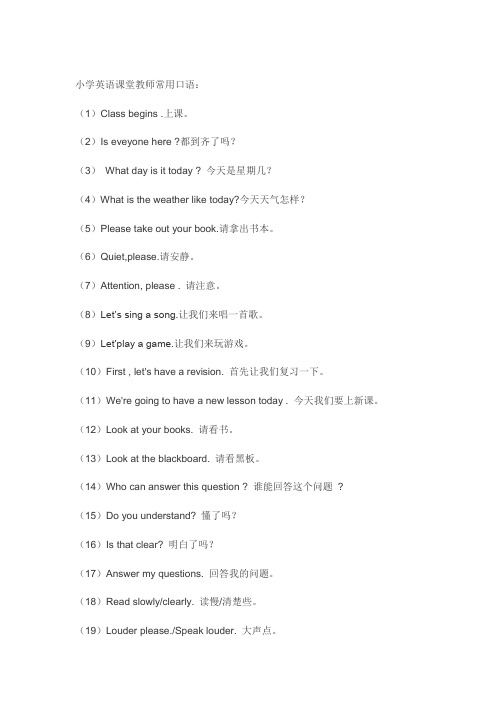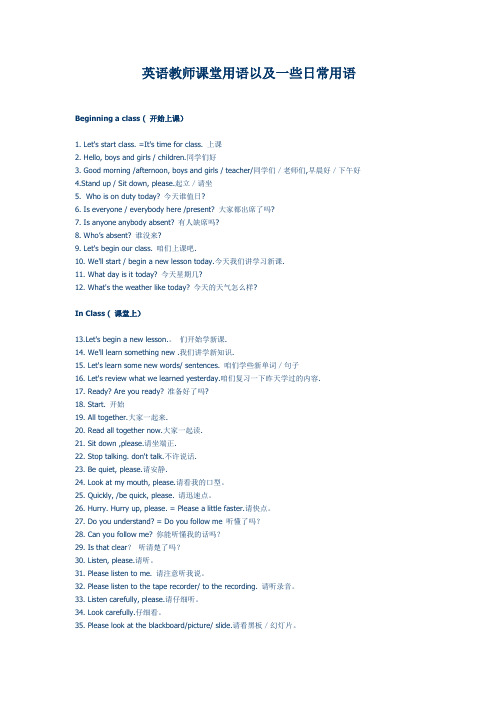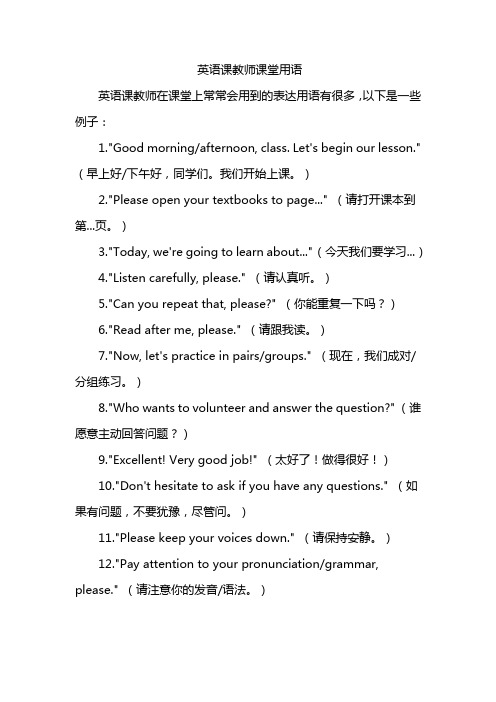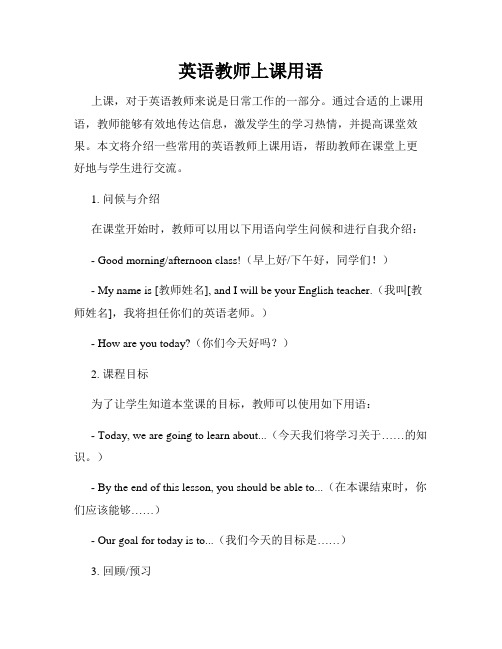英语教师课堂日常用语
英语课堂日常用语

9. How is Amy / your wife / your husband? 爱米好吗?/你妻子好吗?/你丈夫好吗?10. She is very well, thank you. 她很好,谢谢。
11. Good night, Jane. 晚安,简。
12. Good-bye, Mike. 再见,迈克。
13. See you tomorrow. 明天见。
14. See you later. 待会儿见。
15. I have to go now. 我必须走了.二、课堂用语16. May I come in? 我能进来吗?17. Come in, please. 请进。
18. Sit down, please. 请坐。
19. It's time for class. 上课时间到了。
20. Open your books and turn to page 20. 打开书,翻到第20页。
21. I'll call the roll before class. 课前我要点名。
22. Here! 到!23. Has everybody got a sheet? 每个人都拿到材料了吗?24. Any different opinion? 有不同意见吗?25. Are you with me? 你们跟上我讲的了吗?26. Have I made myself clear? 我讲明白了吗?27. Could you say it again? 你能再说一遍吗?28. Any questions? 有什么问题吗?29. That's all for today. 今天就讲到这里。
30. Please turn in your paper before leaving. 请在离开前将论文交上。
三、辨别物品31. What's this? 这是什么?32. It's a pen. 是支笔。
小学英语上课日常用语

小学英语课堂教师常用口语:(1)Class begins .上课。
(2)Is eveyone here ?都到齐了吗?(3)What day is it today ? 今天是星期几?(4)What is the weather like today?今天天气怎样?(5)Please take out your book.请拿出书本。
(6)Quiet,please.请安静。
(7)Attention, please . 请注意。
(8)Let’s sing a song.让我们来唱一首歌。
(9)Let’play a game.让我们来玩游戏。
(10)First , let's have a revision. 首先让我们复习一下。
(11)We're going to have a new lesson today . 今天我们要上新课。
(12)Look at your books. 请看书。
(13)Look at the blackboard. 请看黑板。
(14)Who can answer this question ? 谁能回答这个问题?(15)Do you understand? 懂了吗?(16)Is that clear? 明白了吗?(17)Answer my questions. 回答我的问题。
(18)Read slowly/clearly. 读慢/清楚些。
(19)Louder please./Speak louder. 大声点。
(20)What does it mean? 这是什么意思?(21)Let me see . 让我看看。
(22)Please turn to Page 12 . 请打开书第12页。
(23)It's your turn . 轮到你了。
(24)Who will/can answer this question? 谁来/能回答这个问题?(25)Come to the blackboard. 来黑板跟前。
英语教师课堂用语以及一些日常用语

英语教师课堂用语以及一些日常用语Beginning a class ( 开始上课)1. Let's start class. =It's time for class. 上课2. Hello, boys and girls / children.同学们好3. Good morning /afternoon, boys and girls / teacher/同学们/老师们,早晨好/下午好4.Stand up / Sit down, please.起立/请坐5. Who is on duty today? 今天谁值日?6. Is everyone / everybody here /present? 大家都出席了吗?7. Is anyone anybody absent? 有人缺席吗?8. Who’s absent? 谁没来?9. Let's begin our class. 咱们上课吧.10. We'll start / begin a new lesson today.今天我们讲学习新课.11. What day is it today? 今天星期几?12. What's the weather like today? 今天的天气怎么样?In Class ( 课堂上)13.Let's begin a new lesson.。
们开始学新课.14. We'll learn something new .我们讲学新知识.15. Let's learn some new words/ sentences. 咱们学些新单词/句子16. Let's review what we learned yesterday.咱们复习一下昨天学过的内容.17. Ready? Are you ready? 准备好了吗?18. Start. 开始19. All together.大家一起来.20. Read all together now.大家一起读.21. Sit down ,please.请坐端正.22. Stop talking. don't talk.不许说话.23. Be quiet, please.请安静.24. Look at my mouth, please.请看我的口型。
小学英语常用课堂用语

小学英语常用课堂用语文稿归稿存档编号:[KKUY-KKIO69-OTM243-OLUI129-G00I-FDQS58-常用课堂用语1.Class begins. 上课.2. Stand up, please. 请起立.3. Good morning 早晨好4. Good afternoon 下午好5. Good evening 晚上好6. Sit down, please. 请坐.7. —Who's on duty today —今天谁值日8. —I am. —我值日.9. —Is everyone here —都到齐了吗10. —Are you all here —都出席了吗11. —Yes. —全都出席了.12. —No, Li Mingis absent. —不,李明缺席(没到).13. —Li Ming is ill. —李明病了.14. —May I come in —我可以进来吗15. —Yes, you may. —可以.16. —Of course you may. —当然可以.17. —Yes, please do. —请进.18. Come in, please. 请进.19. Don't belate next time. 下次别再迟到了.20. —What day is today —今天是星期几21. —Today is Monday(Tuesday,Wednesday, —今天是星期一(星期二,星期三,Thursday, Friday, Saturday, Sunday) 星期四,星期五,星期六,星期日).22. —What day is tomorrow —明天是星期几23. —Tomorrow is Monday. —明天是星期一.24. —What day was yesterday —昨天是星期几25. —Yesterday was Monday. —昨天是星期一.26. —What's the weather like today —今天天气怎样27. —It's fine. —今天天晴.28. —It's cloudy. —今天多云.29. —It's windy. —今天有风.30. —It's raining. —今天下雨.31. Don't talk. 别说话.32. Stop talking. 别说话了.33. Silence, please. 请安静.34. Please be quiet. 请安静.35. Sit up(straight). 坐直.36. Let't have a daily talk. 我们来进行日常对话.37. We are going to have a new lesson today. 今天我们上新课.38. Today we are going to have a revision. 今天我们上复习课.39. Listen, please. 请听.40. Listen to me carefully. 仔细听.41. Now listen and repeat. 现在先听, 然后重复.42. Listen to the tape recording. 请听录音.43. Look at my mouth. 请注意我(de)口型.44. Say it after me. 跟我说.45. Read after me.跟我读.46. Say these words (sentences) after me. 跟我说这些单词(句子).47.Read slowly and clearly. 慢慢地、清清楚楚地读.48. Louder, please. 请大声读.49. Don't murmur. 说话声音别太小.50. Say it again. 再说一遍.51. Once more. 再来一遍.52. Think it over. 想一想.53. Try again. 再试一试.54. That抯 better. 好些了.55. How do you pronounce this word 这个单词怎么发音56. Spell this word. 拼这个单词.57. Spell the word “Wednesday”. 拼单词“Wednesday”.58. Who canspell the word “brother” 谁能拼“brother”这词59. How do you spell the word “box” 你怎么拼单词“box”60. The letter“a”is pronouced as [Z] 这个单词中字母“a”读作[Z].in this word.61. The letter“t”is silent in the word 单词“often”中(de)字母“t”“often”. 不发音.62. The letter“e”in “plane” isnot “plane”中(de)字母“e”不发音.pronounced.63. Look at this group of words on the 看黑板上(de)单词.他们含有相同 blackboard. They have the same vowel (de)元音,不是吗sound, don't they 64. What's the meaning of this word 这个单词(de)词意是什么65. Put it into Chinese. 把它译成汉语.66. Put it into English. 把它译成英语.67. Say it in English. 用英语讲.68. Answer in English. 用英语回答.69. What's the Chinese for “bike” “bike”(de)中文意思是什么70. What's the English for “公共汽车” 英语“公共汽车”怎么说71. Please put up your hands.请举手.72. Put down your hands. 把手放下.73. Come to the front. 到前面来.74. Come to the blackboard. 到黑板前来.75. Go to the blackboard. 到黑板那去.76. Go back to your seat(seats). 回到座位上去.77. Look at the cards. 看卡片.78. Lookat the blackboard, please. 请看黑板.79. Look at the slide. 看幻灯.80. Look at the pictures. 看图片.81. Say something about the picture. 谈谈这张图画.82. Ask your classmates to answer your 请你(de)同学们回答这个(你(de))问question. 题.83. Answer my questions, please. 请回答我(de)问题.84. —Can you answer this question —你能回答这个问题吗85. —Let me try. —我来试试.86. —Sorry, I can抰. —对不起我不会.87. Who can help him (her) 谁能帮助他(她)88. Don't be afraid. 不要害怕.89. Don't be nervous. 不要紧张.90. Next, please. 下一个,请.91. You, please. 你,请.92. Who'll have a try 谁愿试一下93. Will you have a try 你来试试好吗94. Any volunteers 谁愿回答95. Let's say the dialogue. 我们来对话.96. Practise the dialogue in pairs. 两人一组练习对话.97. Read the dialogue. You read part A. 读对话.你读A部分.98. Let's act out the dialogue. 我们来表演对话.99. I'd like to have two pupils come up 我想请两位同学上来对话.here and say the dialogue. 100. Wang Hai will be A, and Li Hong 王海充当“A”,李红充当will be B. “B”.101. Let's do pattern drills. 我们来做句型练习.102. Don'tlook at your textbooks. 别看你(de)课本.103. Close your books. 把书合起来.104. Open your books at page 53. 把书打开, 翻到53页.105. Turn back to page 50. 翻回到50页.106. Read by yourselves. 你们自己读.107. Please read the text. 请读课文.108. Please read the first paragraph. 请读第一段. 109. Read in chorus. Ready, start. 齐声朗读.准备,开始.110. Go on, please. 请继续.111. That'll do.可以了.112. Stop here. 停下.113. Do you understand 懂了吗114. Any questions 有问题吗115. May I ask a question 我可以提个问题吗116. Any more questions 还有问题吗117. Let's do some written exercises. 我们来做书面练习.118. Take outyour exercise-books. 拿出你们(de)练习本.119. Let's have a dictation. 我们来听写.120. Are you ready 你们准备好了吗121. I'll read again. Please check up. 我再读一遍, 请核对.122. Have you finished 完成了吗123. Time is up. 时间到了.124. Stop writing. 别写了.125. Hand in your exercise-books, please. 请把你们(de)练习本交上来.126. Pass your exercise-books to the front. 把练习本传到前面来.127. —Any mistakes —有错吗—Yes.(No.) —有.(没有.)128. —Correct it(them), please. —请改正.129. —Is that right(correct) —对吗—Yes. (No.) —对.(不对.)130.That's wrong. 错了.131. All right. 对.132. That's right. 对.133. Very good. 很好.134. That's not quite right. 不完全对.135. Let's sing a song. (Let's sing songs.) 我们来唱歌.136. Let's play a game. (Let's play games.) 我们来做游戏.. For today's homework, make sentences 今天(de)家庭作业是用黑板上(de)单with the words on the blackboard. 词造句.. For homework,copy the new words and 家庭作业是抄生词和句型练习, drills. Do Exercise 4 on page 37. 做37页上(de)练习4.. Write from memory the English alphabet 默写英文字母(大小写).(both in capital and small letters).140. Recite the letters from A to G. 背字母A至G.141. Learn the dialogue by heart. 背对话.142. Put in the missing letters. 填入所缺(de)字母.143. Give the plural forms of these words. 给出下列单词(de)复数形式.144. Turn these sentences into interrogative 把下列句子改成疑问句并回答.sentences and then answer them.145. Make these sentences negative,then 把下列句子改成否定句和疑问interrogative. 句.146. There will be a test on Lesson 6 下周一进行第六课测验.next Monday.147. That's all for today. 今天(de)课就上到这里.148. Class is over. 下课了.149. Goodbye 再见150. See you tomorrow 明天见。
教师上课日常英语用语

教师上课日常英语用语一、问候用语1. Hi!你好!2. Hello!你们好!3. Good morning/ afternoon!早上/下午好!4. Good morning/good afternoon, class/everyone/boys and girls!同学们,上午/下午好!5. How are you?你们好吗?6. Nice to meet/see you.很高兴见到你们Nice to see/meet you again./It’s nice to see you again.很高兴再次见到你们!7. Happy Children’s Day.儿童节喜悦!8. Merry Christmas Day.圣诞节喜悦!9. Happy Mid-Autumn Day.中秋喜悦!10. Happy birthday to you!祝你生日喜悦!11. Happy New Year!新年喜悦!12. Happy Teachers’ Day!教师节喜悦!二、告别用语1. Bye.再见!2. Goodbye/bye-bye。
再见!3. See you!再见!4. See you tomorrow!明天见!5. See you on Tuesday.星期二见!6. Have a nice weekend.周末欢愉!7. Have a nice holiday.假期欢愉!8. Have a good time!祝你们度过一个喜悦的时光!9. Hope to see you again.希望再次见到你们。
三、表扬用语1. Good! ( better best )好!(更好!最佳!)2. Right!正确!3. Yes!是的!4. Very good!非常好!5. Great!太棒了!6. Wonderful!非常精彩!7. Excellent!很棒的!8. Great job!做的可以!9. Well done!做的好!10. Cool!太棒了!11. That was great!非常好!12. You are great!你真棒!13. You have done a great job.你做的非常棒。
英语课教师课堂用语

英语课教师课堂用语英语课教师在课堂上常常会用到的表达用语有很多,以下是一些例子:1."Good morning/afternoon, class. Let's begin our lesson." (早上好/下午好,同学们。
我们开始上课。
)2."Please open your textbooks to page..." (请打开课本到第...页。
)3."Today, we're going to learn about..." (今天我们要学习...)4."Listen carefully, please." (请认真听。
)5."Can you repeat that, please?" (你能重复一下吗?)6."Read after me, please." (请跟我读。
)7."Now, let's practice in pairs/groups." (现在,我们成对/分组练习。
)8."Who wants to volunteer and answer the question?" (谁愿意主动回答问题?)9."Excellent! Very good job!" (太好了!做得很好!)10."Don't hesitate to ask if you have any questions." (如果有问题,不要犹豫,尽管问。
)11."Please keep your voices down." (请保持安静。
)12."Pay attention to your pronunciation/grammar, please." (请注意你的发音/语法。
英语教师上课用语

英语教师上课用语上课,对于英语教师来说是日常工作的一部分。
通过合适的上课用语,教师能够有效地传达信息,激发学生的学习热情,并提高课堂效果。
本文将介绍一些常用的英语教师上课用语,帮助教师在课堂上更好地与学生进行交流。
1. 问候与介绍在课堂开始时,教师可以用以下用语向学生问候和进行自我介绍:- Good morning/afternoon class!(早上好/下午好,同学们!)- My name is [教师姓名], and I will be your English teacher.(我叫[教师姓名],我将担任你们的英语老师。
)- How are you today?(你们今天好吗?)2. 课程目标为了让学生知道本堂课的目标,教师可以使用如下用语:- Today, we are going to learn about...(今天我们将学习关于……的知识。
)- By the end of this lesson, you should be able to...(在本课结束时,你们应该能够……)- Our goal for today is to...(我们今天的目标是……)3. 回顾/预习在开始新的学习内容之前,可以先进行回顾或预习,以帮助学生复习已学知识或引入新的话题。
以下是一些相关的用语:- Let's review what we learned last class.(让我们复习一下上节课学过的内容。
)- Can anyone remember...?(有人能记得……吗?)- Now, let's move on to the next topic.(现在我们来继续下一个主题。
)4. 提问与回答提问是教师引导学生思考和参与互动的重要方式。
以下是一些教师常用的提问用语:- Who can answer this question?(谁能回答这个问题?)- What do you think?(你认为呢?)- Can you give me an example?(你能给我一个例子吗?)- Do you understand?(你们明白吗?)5. 解释与讲解在教学过程中,教师需要向学生解释和讲解知识点。
英语教师课堂用语

情景教学用语
2、在图书馆(In the library)
A: Excuse me, could you tell me where the books about English are?
B: Let me see. They are on the third floor, in the English section
教学常用语
8、作业(Homework)
A: Remember to do your homework. Don't forget B: Yes, I will. Thank you, teacher
3 情景教学用语
情景教学用语
1、打电话(Making phone calls)
A: Hello, this is [ your name]. Is that [ the person you are calling]? B: Yes, this is [ the person you are calling]. Who is that?
B: Thanks for your advice. I'll try again
教学常用语
3、建议(Suggestion)
A: Why don't you try another way? Maybe that will work B: I'll try it. Thanks for your advice
A: Have you finished your homework? B: Yes, we have. / No, we haven't
组织教学用语
5、安静(Be quiet)
A: Please be quiet B: OK
- 1、下载文档前请自行甄别文档内容的完整性,平台不提供额外的编辑、内容补充、找答案等附加服务。
- 2、"仅部分预览"的文档,不可在线预览部分如存在完整性等问题,可反馈申请退款(可完整预览的文档不适用该条件!)。
- 3、如文档侵犯您的权益,请联系客服反馈,我们会尽快为您处理(人工客服工作时间:9:00-18:30)。
• 在让学生参加评价时可以使用疑问和反意 疑问句: • Is it good? • Isn’t it a good answer? • Do you like his/her answer/reading? • Did he/she do a good job? • That’s a fantastic answer, isn’t it? • He/she did an excellent job, didn’t he/she?
• Hi! Good morning/ afternoon. • Good morning/afternoon, class./boys and girls. • It’s so nice/I’m so happy to see you again. • Good , you look great/ wonderful today. • How are you doing? • How’s it going? • You look so happy, any good news? • OK, class/ boys and girls , are you ready to have class/begin?
• • • •
Got it? / Did you get it? Are you alright with it? Are you OK with the practice? Have you done/finished your work/exercise yet?
3.反馈语
• 反馈语可分为肯定式评语、参与式评语和启 发式纠错。 • (1)肯定式评语 • 教师在使用肯定式评语对学生的课堂表现进 行肯定和表扬时,一定要让学生感到老师是 在由衷地夸奖他。要避免敷衍和流于形式。 不要滥用‘Good’。有的老师过多地单一 使用 ‘Good’ 评价学生的表现,很难使学 生从中受到激励,激发学习的积极性。
• • • • • • • • • •
Who’d like to read the text? Who can spell the word “…”? Can you spell the word “…”? Do you know the Chinese/English of the word…? What’s the English/Chinese for “…”? Any volunteer? Any one/ boy/ girl? Have I made it clear? Is it clear to you? You see the point?
• Not bad. Go on, please. • Come on, It’s very close. • It doesn’t matter. I’m sure you can do it better next time.
• • • • •
方式和策略: ① 微笑加语言。 ② 用力点头---是一种肯定。 ③ 惊讶的表情 + 可表示赞赏。 ④ 竖起大拇指,可表示一种高度的赞赏。增 强自信心,获得成就感。 • ⑤ 一只手手心朝上不断煽动四指同时说道: Yes, come on, come on. 或Yes, go on。这 种语言行为和非语言行为手势的同时使用, 不仅对学生的发言是一种鼓励和肯定,同时 还可以激励、引导学生将发言进行下去,启 发学生思维。不断的启发和鼓励能够起到引 导学生思维,培养思维习惯的作用。
• ⑥ 鼓掌---当学生任务完成得出色时,教师可 鼓掌表示赞扬。也可以号召学生一起鼓掌。掌 声可以使人产生成就感,增强自信心。 • ⑦ 抚摸孩子的头,拍拍孩子的肩膀也是一种 鼓励性的非语言行为的评价手段。这一手段的 使用会使回答正确的孩子心中荡起美孜孜的幸 福感和对老师的亲近感。这种感觉可以拉近孩 子和老师的距离,拉近他们和英语课堂的距离, 使他们喜欢上课并激发表达的欲望。对于回答 错误的孩子,这一手段的使用可以起到安慰、 消除他们心中的不安及沮丧、缓解焦虑情绪的 作用。(此方法仅可用于低年级)
• (3) 启发式纠错 • 当学生犯错误时,教师要避免使用否定的 评价语言,如:You are wrong. It’s not correct. 对回答不出问题来的学生不要简单 地使用“Sit down”,要给他们可能获得成 功的机会,鼓励他们,保护他们的学习积 极性。
• That’s very close. Go on! • It’s almost right. Try again, please. • Come on! Think it over. I’m sure you can do it. • I’m sure you can do it if you really try. (See? You did it really well.) • Sorry, I’m sure you can do it better next time. • I’m sorry. Would you like a second try? /Would you like to try again?
• Come to the front, please. / … please come to the front . Thank you. • Thank you. Please go back to your seat. • Thank you. You can go back now. • It’s your turn, Sue. • OK, class/ boys and girls/ children , please stand up. • Please sit down. • Please do it now. • OK, go! • Please work in pairs/ in groups/ individually/ by yourselves.
• • • •
I couldn’t believe my ears! Smart! (What an adorable baby!) Clever! (I envy you very much。 ) Perfect! (You re very professional.)
• (2)参与式评语 • 在采用学生之间互相评价的手段时,教师 要注意不要拿学生跟别人比,要拿学生同 他自己比。教师可以说:同学们说某某同 学说得好不好呀?进步大不大呀?
4.指示/演示语
•洁、清晰并且和蔼、可亲,避免过于生硬。
• Now class/ boys and class, class begins. • Today, we’re going to learn … • Now, open your books, please. Turn to page ... • Now, class/ boys and girls/ children, please look at the blackboard/picture/your books/ page five. • Please read the … together. One, two, three, go! • Now, let’s sing the song… together. • Now, let’s enjoy the song from the tape. • Well, let’s go on. Please look at page …
• • • • •
• • •
•
This time, you do it one by one. Now, listen to the tape. Now, listen to me, please. Now, I’ll read the …, please follow me. Now class/ boys and girls/ children , read after me/ the tape. Follow me, please. Just follow me, class . Yes, please. (To answer “ Let me try or let me answer the question ”) Please show me how well you can do/ read it.
• • • •
May I know your name? (That’s a nice name.) Could you tell me your name, please? (You’ve got a beautiful name. I really like it. ) • Shall we begin our lesson now? • Let’s start our class, shall we?
2.提问语
• 教师在提问时态度和声音要和蔼、可亲。 提问语的使用要注意体现对学生的尊重, 不要让学生感到紧张,有压力。注意提问 语的使用策略可减轻学生的学习焦虑情绪, 保护学生的学习积极性。
• • • • • • • • • •
Who’d like to answer the question? Who can answer the question? Who knows the answer? Who’d like to have a try? Would you like to try, Mary? Tim, would you like to have a try? Do you want to try, Lee? Would you like a second try? Would you like someone to help you? Who’d like to help?
• Not bad. Thank you. (I’m sure you can do better next time.) • Good!Thank you. (I could see you’ve practiced a lot.) • Good boy/ girl . That’s a good answer. Thank you. • Quite good! (I really appreciate your effort.) • Very good!(I really enjoy it.) • Great! (You did a good job.) • Excellent! (Let’s give him/her a big hand!) • Wonderful!(I’m so proud of you.) • Well done! (Good boy/girl.)
